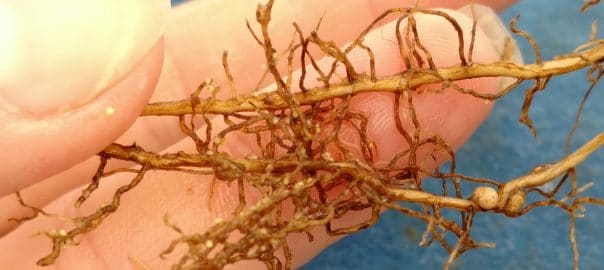Once you’ve sample your field, had it tested, and you have soybean cyst nematode (SCN), you’ll want to consider SCN-resistant varieties, but there are certain populations of SCN that can reproduce on certain SCN-resistant varieties so how do you know what resistant variety is best for your field – you find out the HG Type of your population – a costly test that UT is offering for free this year to TN farmers. Continue reading
Category Archives: Soybean
Roundup Ready Soybean Response to Dicamba Exposure
The most recent inquires have been on what is the likely yield loss from dicamba drift to non-Xtend soybeans? These have come from fields that showed dicamba drift injury to the soybeans this summer and now are staying green delaying harvest this fall.
These questions have been frequent the last few years. Research funded by the United Soybean Board was conducted in the Mid-south and Midwest this summer to help answer the question. Continue reading
Dealing with Soybean Seed Quality Issues
With the extended wet weather in late September, growers in many parts of the southeast are dealing with varying degrees of seed quality issues in soybean as they move through harvest. Continue reading
What’s the difference between nematodes?
The last two weeks we’ve published articles highlighting the free soil testing for 2018, which is screening for the ‘silent yield robbers’: pathogenic nematodes and charcoal rot. This article gives a brief description on how pathogenic nematodes differ – their effect on yield and different management options. Continue reading
Soilborne Pathogen Screening: 2017 Results and 2018 Screening
Last week’s article discussed soilborne pathogens as ‘silent yield robbers’ of crops in production fields and the importance of screening. This article elaborates on two of the most common pathogens found in soybean fields, soybean cyst nematode (SCN) and charcoal rot, and presents the results from our 2017 soil screening. Continue reading

Free Soil Testing for Pathogens
Don’t miss out on the opportunity to have your soil tested for parasitic nematodes and charcoal rot at no cost for Tennessee Farmers ($15 fee for out-of-state samples). Continue reading
Taproot Decline: A new soybean disease for Tennessee
Taproot decline (TRD) is a new disease to us in Tennessee and other states in the Southeast. A member of the genus (Xylaria) was first isolated from soybean in Ethiopia in the ‘70s , however researchers at that time did not confirm if this fungus was the pathogenic species that is now affecting soybeans across the southeastern US. The first report of taproot decline as a pathogen of soybean was published just last year, with sightings of this disease first occurring in 2007. Other states that have reported cases of TRD include Alabama, Mississippi, Louisiana, and Missouri with an increasingly northern range. A production field in Saulsbury (Hardeman County) was confirmed to have soybeans affected by TRD in August 2017, and two additional research fields in Gibson and Madison counties were confirmed in August 2018. Foliar symptoms were initially spotted at growth stage R6 (i.e. full seed); these foliar symptoms can easily be confused with those due to other diseases like sudden death syndrome and stem canker, and closer observation is needed for disease Continue reading
Call of the Week: Don’t Stop the Scouting
Dr. Scott Stewart advises producers to keep scouting late soybeans for insects. Listen to the latest episode.

